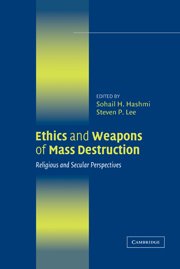Book contents
- Frontmatter
- Contents
- Tables and Figures
- Acknowledgments
- Abbreviations
- Ethics and Weapons of Mass Destruction
- Introduction
- 1 Weapons of Mass Destruction: A Brief Overview
- 2 The International Law Concerning Weapons of Mass Destruction
- PART ONE THE ORIGINAL DEBATE
- PART TWO EXPANDING THE CONVERSATION
- PART THREE CRITICAL PERSPECTIVES
- 21 A Feminist Ethical Perspective on Weapons of Mass Destruction
- 22 A Pragmatist Feminist Approach to the Ethics of Weapons of Mass Destruction
- 23 Pacifism and Weapons of Mass Destruction
- 24 Pacifism and Weapons of Mass Destruction: The Challenge of Peace
- 25 Weapons of Mass Destruction and the Limits of Moral Understanding: A Comparative Essay
- Contributors
- Index
25 - Weapons of Mass Destruction and the Limits of Moral Understanding: A Comparative Essay
Published online by Cambridge University Press: 05 June 2012
- Frontmatter
- Contents
- Tables and Figures
- Acknowledgments
- Abbreviations
- Ethics and Weapons of Mass Destruction
- Introduction
- 1 Weapons of Mass Destruction: A Brief Overview
- 2 The International Law Concerning Weapons of Mass Destruction
- PART ONE THE ORIGINAL DEBATE
- PART TWO EXPANDING THE CONVERSATION
- PART THREE CRITICAL PERSPECTIVES
- 21 A Feminist Ethical Perspective on Weapons of Mass Destruction
- 22 A Pragmatist Feminist Approach to the Ethics of Weapons of Mass Destruction
- 23 Pacifism and Weapons of Mass Destruction
- 24 Pacifism and Weapons of Mass Destruction: The Challenge of Peace
- 25 Weapons of Mass Destruction and the Limits of Moral Understanding: A Comparative Essay
- Contributors
- Index
Summary
Warfare poses difficulties for our moral understanding. It involves, for example, the killing of large numbers of people, something generally morally prohibited. As if warfare in general did not pose a sufficient challenge to ethics, however, developments in the means of warfare are constantly creating new moral difficulties. Any moral consensus reached about warfare is likely to be confounded in time by new military technology. Such is the case with weapons of mass destruction, the ethical implications of which are our subject. The purpose of this volume is to understand whether these weapons can be incorporated into our moral understanding of warfare and, if so, how. The method is to consider these questions from a diversity of ethical perspectives and traditions. This chapter offers a comparative discussion of the preceding essays in the volume on these matters.
The authors considered six questions about how their traditions view WMD. The first question concerns the source within the traditions of the principles and norms governing general conduct in war. The second and third questions are about the moral status of the use of WMD, their use in war (question two), and their use as a deterrent (question three). The fourth and fifth questions consider the moral acceptability of the possession of WMD, including proliferation, the acquisition of the weapons by states without them (question four), and disarmament, the deacquisition of the weapons by states already having them (question five). Finally, question six is about concrete options for change.
- Type
- Chapter
- Information
- Ethics and Weapons of Mass DestructionReligious and Secular Perspectives, pp. 482 - 510Publisher: Cambridge University PressPrint publication year: 2004
- 2
- Cited by



